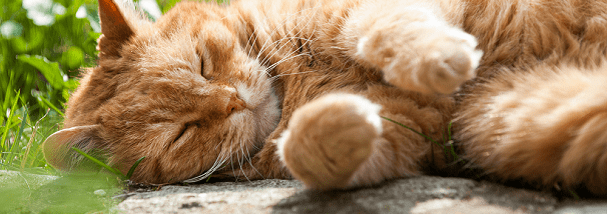 This is a really common disease in older cats that can develop. Luckily there is a lot we can do to help manage this disease.
This is a really common disease in older cats that can develop. Luckily there is a lot we can do to help manage this disease.
Chronic renal failure can develop in 33% of cats that are over 8 years old. The kidneys start "shutting down" and are less able to effectively filter the blood. This reduced ability to filter the blood means that toxins can build up in the blood stream and make your cat feel very unwell.
Symptoms of kidney disease include:
- Urinating more
- Urinating in inappropriate places
- Drinking more
- Reduced appetite
- Poor coat condition
- Lethargy
- Weight loss
- Vomiting
- Diarrohea
Early signs
Older cats can have their urine concentration checked regularly to look out for early signs of this disease as it is often the concentration of urine that changes first before other symptoms become apparent. The earlier this disease is caught the better chance we have of helping.
To be able to diagnose a cat with kidney disease a urine sample and a blood sample are required to understand the concentrating ability of the kidneys and the level of toxins building up in the blood. Often with more severe kidney disease, a cat's blood pressure also increases and they can also lose valuable protein from their blood into their urine. These are all valuable factors to help us stage how severe the kidney disease is. The IRIS staging system is a system veterinary professionals use to grade the severity of kidney disease and to help see response to treatments.
In some cases the veterinary surgeon may suggest an ultrasound of the kidneys and bladder, and may take small biopsies of the kidney to help diagnose why the kidneys are failing.
Kidney disease can lead to secondary complications such as anaemia, urinary infections, high blood pressure and low potassium levels.
Treatment of renal failure
Once chronic renal failure has been diagnosed the vet will chose treatments for your cats that will help to make your cat feel better and live longer. These treatments include:
Encouraging water intake
Cats with chronic renal failure can become dehydrated very quickly so maintaining good hydration levels is very important to slow down the progression of kidney failure. This can be done through wet foods and lots of water bowls or fountains around the house.
Sometimes visits to the vets may be necessary for intravenous or sub-cutaneous fluids can help replace fluid loss. Sub-cutaneous fluids can be administered at home, but please ask your veterinary surgeon about this.
A change in diet to a specialised kidney diet
This helps by restricting proteins and phosphates which can put more pressure on the filtering processes of the kidneys.
Many toxic products that accumulate in the blood in chronic kidney disease are a result of protein breakdown, and feeding a reduced protein diet will help to minimise this.
Restricting phosphate content of the diet can help protect against further insult to the kidneys. However if phosphate levels in the blood remain high despite a low phosphate diet then drugs known as 'phosphate binders' may be necessary.
Low potassium levels supplemented with potassium supplements
Drugs that control blood pressure may be required. Cats with chronic renal failure often have high blood pressure (hypertension). As the kidneys shut down the blood vessels in the kidneys become very small, so the body has to increase its blood pressure to be able to keep blood flowing through these tiny vessels. Increased blood pressure can make chronic kidney disease worse and it can also cause blindness. It is important to regularly monitor blood pressure which can be done at the veterinary practice. If a cats blood pressure is high then drugs such as ACE inhibitors and amlodipine may be helpful.
Some cats can become anaemic
The kidney is responsible for producing a hormone that stimulates red blood cell production. As the kidneys shut down then the body's red blood cell making mechanism reduces which can lead to anaemia. This can be monitored by regular blood testing and treatments such as steroids, iron supplements and EPO (the hormone that stimulates red blood cell production) are available.
Many cats with this disease feel unwell
They often feel nauseous and inappetant. There are many medications we can give to reduce this feeling which in turn will help stimulate appetite.
Chronic renal failure is often managed using 'ACE inhibitors'
These are vasodilators which dilate blood vessels and work by opening up the small blood vessels in the kidneys, which will lower blood pressure and reduce protein loss through the kidneys.
Kidney transplants are available in some countries, however there are ethical questions to be asked with this. For example, can a donor give consent? The surgery has variable success and many cats with a donor kidney may reject the kidney.
Cats with chronic kidney failure have a better chance of survival and a good quality of life with treatment and management. It is a progressive disease however, and sometimes despite all the best treatments eventually the body will not be able to cope any more and euthanasia may be in the cat's best interest.
It is difficult to understand how quickly the disease will develop. In some cats it can happen very fast, and in others it may be very slow. At Vet4life, our main concern is giving your cat the best quality of life.
If you are concerned your cat may be showing some of the symptoms then please come and see us for further advice. You can call the Teddington team on 020 8977 3955, the Shepperton team on 01932 229 900, or send us a message here. Alternatively, if your cat is over 8 years of age then why not ask us about testing your cat's urine to look for early signs of any problems?
We are always here to offer advice and ensure your pets have the best quality of life as they get older.


